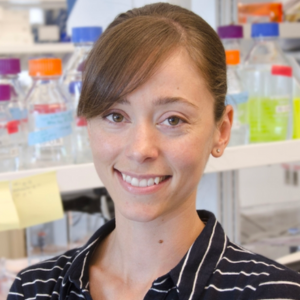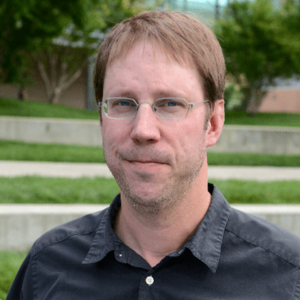Olivia Rissland, PhD, associate professor of biochemistry and molecular genetics at the University of Colorado School of Medicine, has been awarded a $1 million grant from the W.M. Keck Foundation to study cells that produce extremely large amounts of a single type of protein.
Rissland’s goal is to better understand molecular vulnerabilities in such cells. Her research team will focus on collagen, which accounts for about 30% of the total protein in the body.
“The basic idea is to study how some cells produce a lot of one thing,” says Rissland, who conducts research on the mechanics of protein production. “You can think of a cell as a manufacturing plant. Many cells make a lot of different things, but there are some very important cells in our bodies that make a lot of just one thing.”
Her project also plans to explore how the cell builds and specializes its own internal machinery to make its protein-production manufacturing plant run.
“The cool thing is that the cell had to originally make all that machinery inside itself,” Rissland says. “A big unanswered question is how does it know how much of the machinery to make? How does it know if it doesn’t have enough?”
Collagen is a test case to explore hypotheses about what Rissland calls “ultra-dedicated” production of a single protein. Insight into collagen synthesis could yield better understanding of other essential proteins, such as insulin released by pancreatic beta cells or antibodies secreted by B cells.
“Most cells in the body are jacks of all trades, and these have historically been what we study. This study is trying to understand the other side of the coin — how cells rewire themselves to be able to make large amounts of one or a very few proteins,” says Jay Hesselberth, PhD, professor of biochemistry and molecular genetics. “Collagen is really a great place to start because we have readily available tools in the lab to study it.”
Rissland’s lab will explore the quality control processes that enable the cell to function optimally.
“The act of making a protein is called translation,” she says. “If translation is going slowly or is stalled or if there are other problems, that’s where these quality control pathways will come in to try to deal with the problem.”
With so many potential ways that the process can break down, it’s critical to understand those pathways.
“You have a manufacturing plant where you’re going to have to make a lot of one thing, but making high levels of one protein creates pinch points,” Rissland says. “The likelihood of there being some stalls or slowdowns is actually very high.”
Understanding the ripple effect of those slowdowns could offer insight into the causes of disease or the impact of aging.
“It’s a very complicated process, but the most exciting part of the job is going into new fields,” Rissland says.
The W.M. Keck Foundation, founded in 1954, funds pioneering biological and physical science research and engineering. The mandate of the Foundation’s Research Program is to support pioneering discoveries in Science, Engineering, and Medical Research. The Foundation funds the high-risk and high-impact work of leading researchers to lay the groundwork for new paradigms, technologies, and discoveries that will save lives, provide innovative solutions and add to our understanding of the world.
Projects funded by the Keck Foundation are distinctive and novel in their approach, question the prevailing paradigm, or have the potential to break open new territory in their field. The Foundation prioritizes grants that pioneer biological and physical science research and engineering, including the development of promising new technologies, instrumentation or methodologies.





